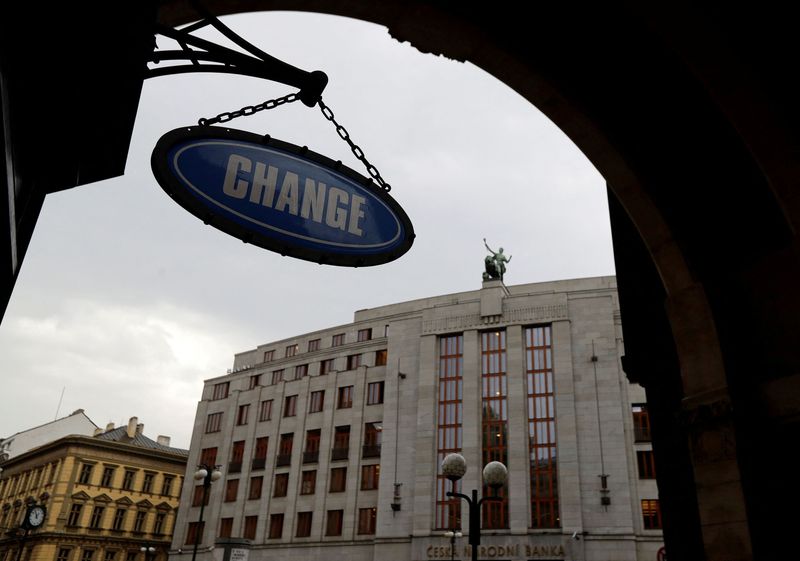
© Reuters. FILE PHOTO: A sign of a currency exchange office hangs in front of the Czech National Bank in Prague, Czech Republic, August 3, 2017. REUTERS/David W Cerny
By Robert Muller and Jason Hovet
PRAGUE (Reuters) -The Czech National Bank lifted its benchmark rate by 50 basis points to its highest level since 2001 on Thursday and said it was ready to tighten policy further to keep inflation expectations anchored while the war in Ukraine pushed prices higher.
The central bank board voted 5-2 to raise the two-week repo rate to 5.00%, with two policymakers opting to keep rates steady. It has raised that rate by 475 basis points since last June in one of the most aggressive tightening campaigns.
Czech inflation hit a more than two-decade high of 11.1% in February on the back of strong consumer demand, rising wages growth and rising costs of inputs for companies.
Russia’s invasion of Ukraine added to the price pressures by driving up energy and commodity prices, while also prompting downward revisions to growth forecasts.
Governor Jiri Rusnok said the conflict would roughly halve this year’s economic growth from earlier forecast 3.0%.
He also said the board was ready to keep raising interest rates to prevent inflation expectations from straying from the bank’s 2% target in the longer term.
He said policymakers discussed a bigger hike but the majority settled for the 50 basis point move.
“We will adjust if needed, if new data shows this,” Rusnok said.
The central bank anticipated a “noticeable” increase in inflation in the coming months, and Rusnok said restoring price stability was now CNB’s “absolute priority”.
Since the central bank’s intervention early this month to counter the crown’s slide, Rusnok has raised an option of using currency reserves not just as a tool to smooth out exchange rate swings but also to help fight inflation.
Some central bankers have been hesitant about reverting to such a tool and Rusnok said on Thursday a debate on such option would continue, but no decisions have been made.
The crown has steadied since hitting a 10-month low in early March, and it traded up 0.25% on the day at 24.385 to the euro on Thursday, a swing of over 6% from March lows and around levels seen before the conflict started.
Source: Investing.com





























